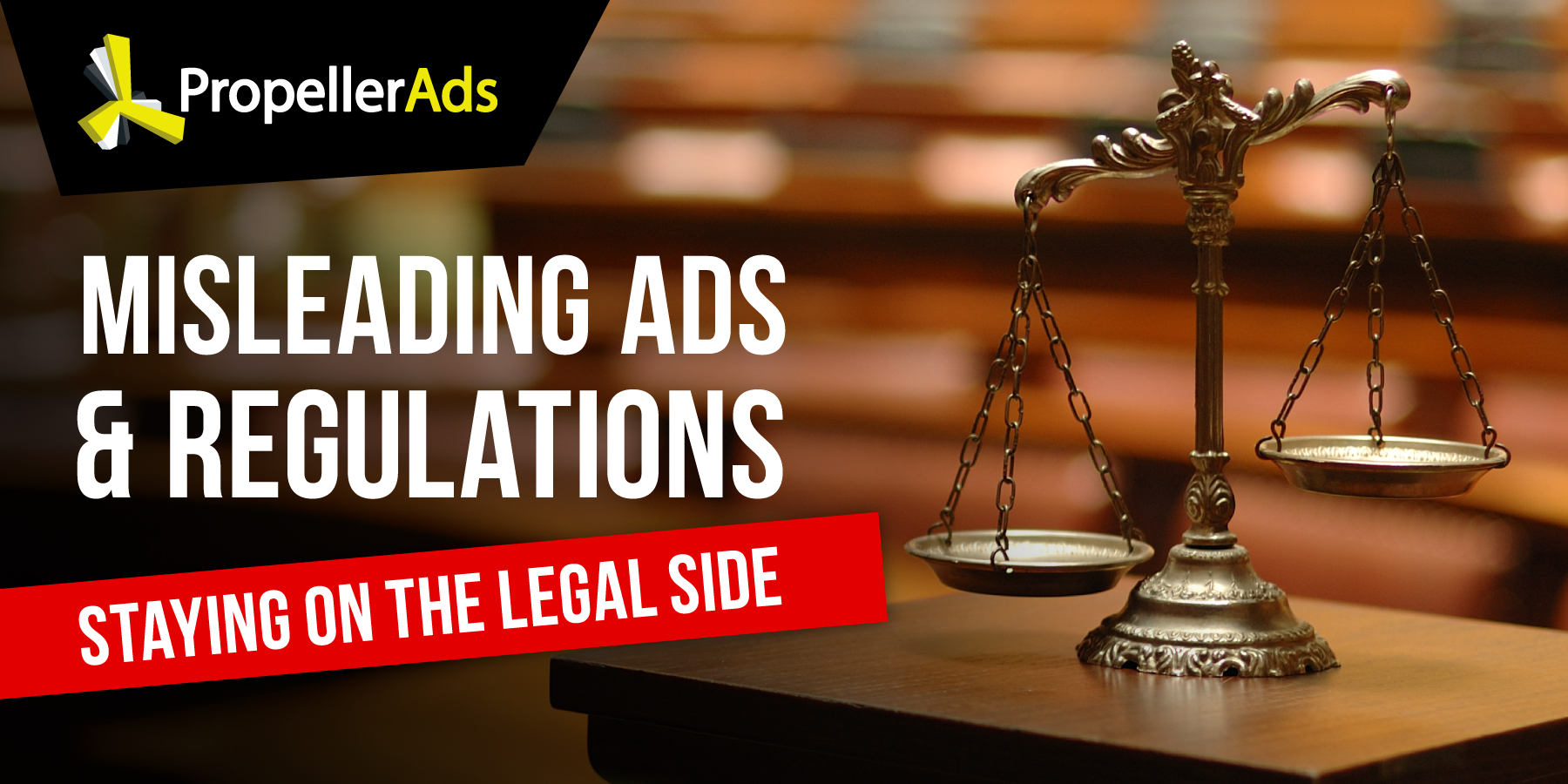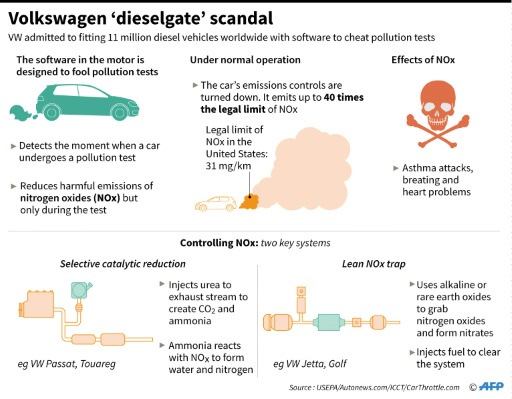Staying on the Legal Side: Misleading Ads & Regulations Around the Globe

Misleading ads have become one of the biggest problems in the digital marketing space. Besides directly affecting consumers, these deceptive ads also affect advertisers and networks as it discredits the entire industry as a whole.
Read more: Investigating Misleading Ads: What Are They and Why You Should Avoid Them
Despite the fact that misleading ads can result in negative business repercussions, some advertisers still choose to employ these deceptive strategies.
That being said, there are also severe legal consequences that, depending on your location, can result in hefty fines and other legal consequences.
In this article, we’ll discuss the legal repercussions of employing misleading ads and how to stay on the right side of the law, according to your location.
Defining Misleading Ads
It’s worth noting that the definition of misleading ads, as well as the laws that apply to companies who use these tactics, vary slightly depending on your location. Generally speaking, misleading ads can be defined as the inaccurate portrayal of information in order to get a reaction from a user.
Despite the channel being used, all claims made by advertisers should give consumers clear and precise information about the product or service they are viewing. Any unproven facts, relevant omissions, or false information used are considered misleading advertising.
Rules and Regulations Regarding Misleading Ads
Because the rules and regulations vary depending on your geographical location, for the purpose of this article, we will focus on the US, UK, and EU markets.
United States
In the US, the major governing and regulatory body for the advertising industry is the Federal Trade Commission, known simply as the FTC. According to the FTC, regardless of the marketing channel, all pieces of advertising should be truthful, appropriate, and backed by scientific evidence whenever possible.
It’s worth mentioning that the FTC focuses on ads that make claims related to health or that affect consumer finances. Items like over-the-counter-drugs, dietary supplements, food, tobacco, and alcohol receive special attention, so advertisers in these spaces should be extra careful!
Bans and Regulations
Besides paying special attention to the aforementioned industries, the FTC has also issued general statements banning:
- Inaccurate claims
- Incomplete information that affects consumers in any way
- Deceptive tactics
- Facts that are not backed up by scientific evidence
- Ads that affect consumer behavior
- Any type of unfair or hateful advertising
Who is Held Accountable?
According to legal experts, all parties involved in the “creation” of misleading content may be held accountable. This, however, is not limited to the original creator of the ad itself. Involved parties may also include endorsers, advertising agencies, producers, and networks that approved the misleading ads in the first place.

“DieselGate” – one of the biggest misleading ads scandals of the recent years. Image by Phys.org
The US Government is suing Volkswagen for false advertising as a result of VW misrepresenting the cleanliness of its diesel-powered cars in numerous advertisements over the past eight years.
This lawsuit, filed in US District Court for the Northern District of California by the US Federal Trade Commission, states that Volkswagen’s advertising claimed its “Clean Diesel” vehicles had low emissions, were environmentally friendly, and retained a high resale value. Now, we know that none of those things are true, and the FTC is looking to punish Volkswagen’s alleged unfair and deceptive practices. More
Legal Consequences
Once it has identified an instance of fraud or misleading ads, the FTC can take several actions that may result in:
- Issuing of orders to cease and desist
- Injunctions by federal district courts
- Civil penalties of up to $40,654
- Fines up to $41,484
- Refunds and compensation for affected consumers
Learn more about the FTC’s regulations by visiting their website.
United Kingdom
The United Kingdom’s independent organization known as the Advertising Standards Authority (ASA) is the leading body for the marketing and advertising industry. According to the government’s official website, all pieces of online advertisement should be truthful, honest, socially responsible, legal, and portray an accurate description of the product or service.
In addition to the above, the ASA requires advertisers to follow strict regulations that dictate what they can and can’t do. At the same time, marketers must follow 2 different advertising codes of practice in order to do so legally.
Bans and Regulations
The ASA has banned pieces of advertisement that include or make use of:
- Aggressive sales techniques, like scare tactics
- Omission of important information
- False or deceptive messages
- Unlawful use of influencers, competitor logo, or trademark
- Misinformation about the product or service
Who is Held Accountable?
Unlike the US, only advertisers and marketers are held responsible for misleading ads in the United Kingdom, unless they could rely on another defense. It’s therefore completely the advertisers’ responsibility to make sure all claims made in their ads are truthful. This is one of the reasons why many advertisers in the UK also choose to include disclaimers in their ads.

Ryanair and LastMinute.com adverts banned for ‘misleading’ customers.
The low-cost carrier was subject to a single complaint after it broadcast a television advert on 5 October with on-screen text reading ‘Fly from £19.99. Fares one way. Book by 10/11/16. Travel by 25/03/17.’ The advert then concluded by displaying the message ‘Summer 2017 on sale now’.
One frustrated holidaymaker complained that this promotion gave them cause to believe the promotional offer would be applied to flights booked for summer 2017 when this was not the case, with Ryanair attesting that the promotion was valid only for travel until 25 March 2017 as stated.
Legal Consequences
If any of the regulations discussed above are broken, this may result in:
- Being reported to the local Trading Standards office
- Unspecified fines
- Criminal prosecution
- Imprisonment for severe cases and repeat offenders
European Union
While there is no governing body for the marketing industry in Europe, self-regulating entities such as the European Interactive Digital Advertising Alliance (EDAA) and the Interactive Advertising Bureau (IAB) have taken on the responsibility of defining and outlining deceptive misleading tactics.
Also remember that misleading ads still fall under the category of unfair commercial practices, so parties involved can be held accountable and processed from a legal perspective.
Bans and Regulations
According to the European Parliament, all advertising channels should abstain from using:
- Inadequate use of quality labels
- Hidden advertisements
- Ads that distort the nature of the product
- Misleading pricing information
- Facts that are not backed up by scientific evidence
- Erroneous information about availability and supply of the products
Who is Held Accountable?
According to experts in the EU, ad networks and other disseminators should verify the validity of the claims that will appear on their ad. If they don’t, both advertisers and networks can be held liable for misleading ads, so disseminators have as much responsibility as all other parties.
Legal Consequences
People or companies who participate in misleading ads may receive communications from courts ordering them to:
- WIthdrawal of the illicit advertising
- Prohibit any further usage of unlawful advertising
- Unspecific fines
- Compensation for affected consumers
As you see, staying on the legal side isn’t that hard if you abide the laws and respect your customers. Want to know more? Join our webinar, where we’ll discuss Native Push Notifications and our policy in regards to Push Notifications. See you at the webinar!

